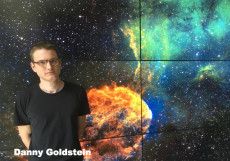C3 Graduate Student Researcher Wins 2017 Berkeley Trumpler Award
May 1, 2017
Danny Goldstein, a Berkeley Lab Graduate Student Researcher in CRD’s Computational Cosmology Center, has been awarded the Berkeley Trumpler Award for his academic excellence, as well as his outstanding record of involvement in the UC Berkeley Astronomy Department and wider astronomical community. Goldstein’s advisor Peter Nugent, who is also CRD’s Deputy for Scientific Engagement, nominated him for the award.
At Berkeley Lab and UC Berkeley, Goldstein works on developing strongly gravitationally lensed Type Ia supernovae as a novel way to measure dark energy and the expansion rate of the universe. With Eric Linder, Saul Perlmutter, and Alex Kim of Physics Division and Dan Kasen of the Nuclear Science Division, Goldstein and Nugent are launching a collaboration based at Berkeley Lab to establish strongly gravitationally lensed Type Ia supernovae as cosmological probes in anticipation of the Zwicky Transient Facility (ZTF), the Large Synoptic Survey Telescope (LSST), and the Wide Field Infrared Survey Telescope (WFIRST).
In 2013, Goldstein worked with Nugent to develop a machine learning framework to automate the discovery of supernovae and other interesting astronomical transients in data from the Dark Energy Survey using a random forest method. In April, astronomers publicly announced that a machine learning pipeline running at NERSC helped identify the first-ever multiply imaged, gravitationally lensed Type Ia supernova. On the heels of that discovery, the duo revealed their innovative method for finding more of these rare events in existing and future large-scale imaging surveys. With more of these observations, cosmologists may be able to measure the expansion rate of the Universe with a precision of less than one percent, helping to resolve a discrepancy that has led to a debate over the “standard model” of cosmology.
About Berkeley Lab
Founded in 1931 on the belief that the biggest scientific challenges are best addressed by teams, Lawrence Berkeley National Laboratory and its scientists have been recognized with 16 Nobel Prizes. Today, Berkeley Lab researchers develop sustainable energy and environmental solutions, create useful new materials, advance the frontiers of computing, and probe the mysteries of life, matter, and the universe. Scientists from around the world rely on the Lab’s facilities for their own discovery science. Berkeley Lab is a multiprogram national laboratory, managed by the University of California for the U.S. Department of Energy’s Office of Science.
DOE’s Office of Science is the single largest supporter of basic research in the physical sciences in the United States, and is working to address some of the most pressing challenges of our time. For more information, please visit energy.gov/science.










